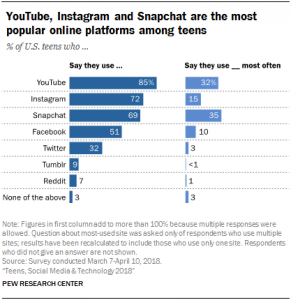Susan O'Rourke | December 10, 2021
UNC World View looks forward to the start of a new year and the continued engagement with global themes and events in classrooms. As educators prepare to discuss important environmental, cultural, political, and economic events, we want to share resources on media literacy. Incorporating media literacy into classroom discussions creates great opportunities for students to practice rhetorical analysis and evaluate the power behind language, the selection of evidence, the structure of an argument, and the emotional impact of images or videos accompanying a publication. These lessons can also teach students important research skills as they learn where to search for credible (and even scholarly) sources and as they evaluate the intended purpose and audience for each publication, post, or video.

Teaching media literacy is especially important as students increasingly engage with social media. According to a 2018 survey conducted by the Pew Research Center, 85% of teens surveyed “say they use YouTube,” 72% “say they use Instagram,” 69% “say they use Snapchat,” 51% “say they use Facebook,” and 32% “say they use Twitter.” The researchers in this study further found that “95% of teens now report they have a smartphone or access to one” and “5% of teens now say they are online on a near-constant basis.”
Several organizations have created lessons and tools for educators looking to teach media literacy and evaluate bias. Facing History & Ourselves, for example, has put together a guide that can help students reflect on their media consumption, evaluate bias, and plan how they will “adopt…healthy news habits.” Broken into a series of three activities, the guide asks students to talk through questions including:
- “How do you learn about what’s happening in your community, your country, and around the world?
- How do you get your news? (from peers, parents, teachers, newspapers or magazines, online news sources, social media?)
- Why is [a particular] event controversial?
- How will you try to become aware of and overcome confirmation bias when you respond to news and information?
- Why is this important? What effect does the way we all consume news and media have on our society? On our ability to live up to the ideals of democracy?”
We hope these resources will help enrich classroom discussions as educators continue to bring global events into their local classrooms.
ADDITIONAL RESOURCES:
Media Literacy Lessons
- AllSides for Schools
- Ad Fontes Media’s Interactive Media Bias Chart 5.0
- Common Sense Education’s Digital Citizenship Curriculum
- Kindergarten: “Media Balance is Important” (Song)
- 1st Grade: “Pause & Think Online” (Song)
- 2nd Grade: “We, the Digital Citizens” (Song) and “Let’s Give Credit”
- 3rd Grade: “Is Seeing Believing?”
- 4th Grade: “A Creator’s Rights and Responsibilities”
- 5th Grade: “Reading News Online”
- 6th Grade: “Finding Credible News”
- 7th Grade: “The Four Factors of Fair Use”
- 8th Grade: “This Just In!”
- 9th Grade: “Hoaxes and Fakes”
- 10th Grade: “Challenging Confirmation Bias”
- 11th Grade: “Clicks for Cash”
- 12th Grade: “Filter Bubble Trouble”
Resources for Analyzing News and Current Events
- The Choices Program from Brown University- “Teaching with the News: Free lessons connect your classroom to headlines in the news”
- AllSides News
- The Freedom Forum’s “Today’s Front Pages” Database
Resources for Building Respectful Dialogue
- AllSides for Schools- Lesson Plan– “Relationships First”
- Anti-Defamation League– “Can We Talk? Tips for Respectful Conversations in Schools, Workplaces and Communities”
- Resources from the University of Michigan’s Program on Intergroup Relations and Center for Researching on Learning and Teaching
